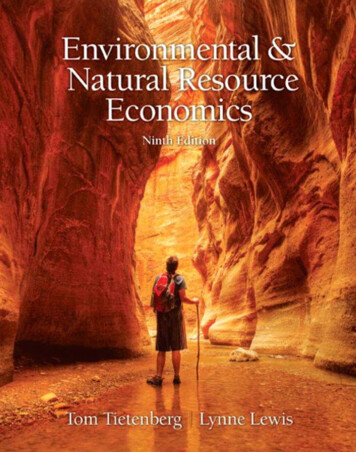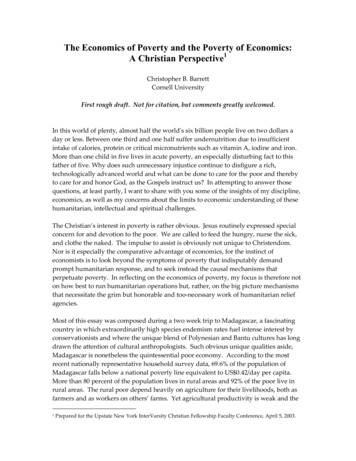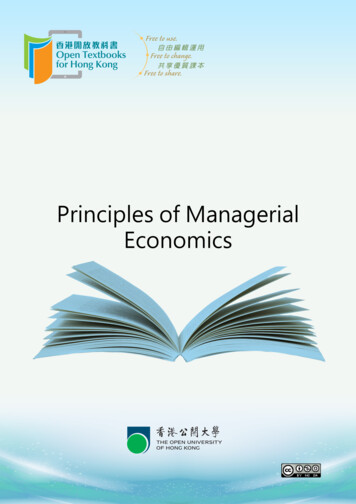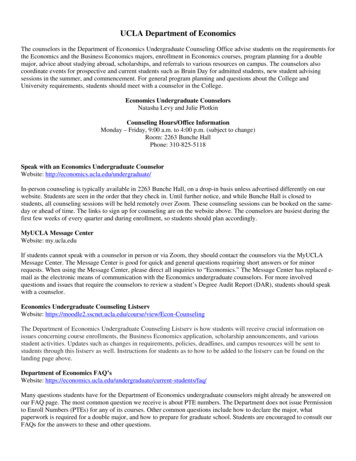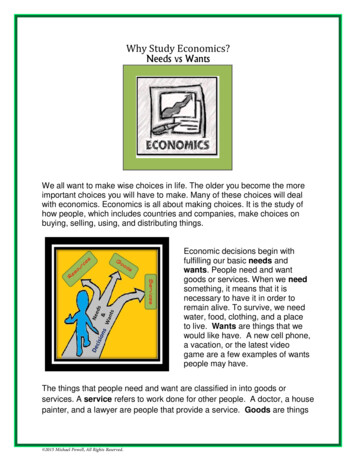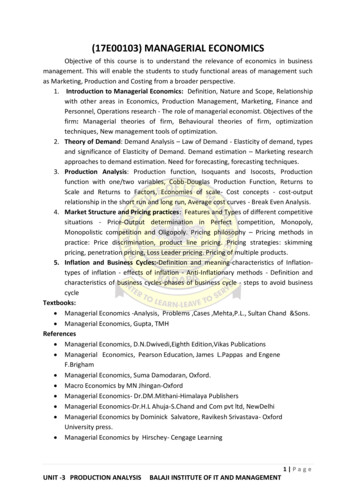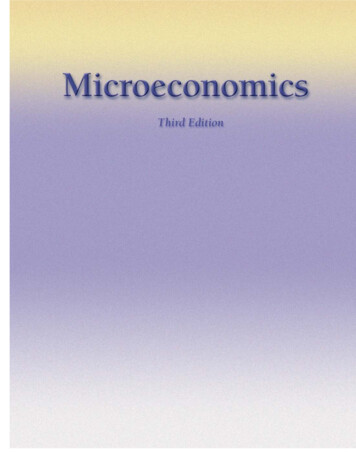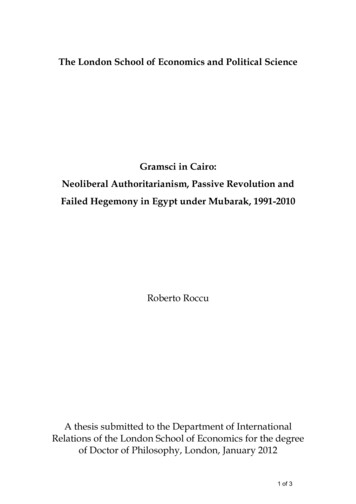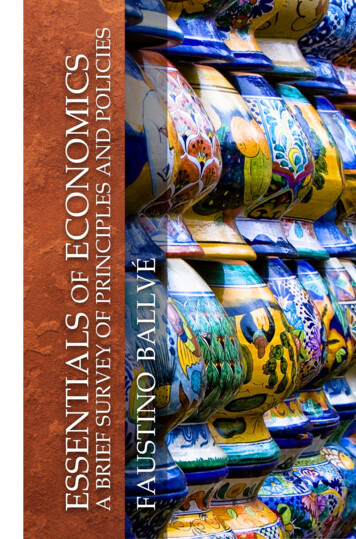
Transcription
Essentials of Economicsa brief survey of principles and policiesbyfaustino ballvéTranslated from the Spanish and Edited byARTHUR GODDARDd. van nostrand company, inc.princeton, new jerseytorontolondonnew york
D. VAN NOSTRAND COMPANY, INC.120 Alexander St., Princeton, New Jersey (Principal office)24 West 40 Street, New York 18, New YorkD. Van Nostrand Company (Canada), Ltd.358, Kensington High Street, London, W.14, EnglandD. Van Nostrand Company Ltd.25 Hollinger Road, Toronto 16, CanadaCopyright, c 1963 byWILLIAM VOLKER FUNDPublished simultaneously in Canada byD. Van Nostrand Company (Canada), Ltd.No reproduction in any form of this book, in whole or in part(except for brief quotation in critical articles or reviews), may bemade without written authorization from the publishers.1st edition, Mexico, 1956—10,000 copies2nd edition, Mexico, 1961—5,000 copies3rd edition, Mexico, 1961—5,000 copiesFrench translation, Paris, Sélif, 1957Spanish editions in Buenos Aires and Guatemalaand in preparation in ColombiaTranslations in preparation in Germany, Brazil,and Japanprinted in the united states of america
ForewordFaustino Ballvé was one of those rare scholars who instinctivelyavoid the pitfalls of specialization; who have the gift of integratingthe divisions of learning simply, yet without oversimplification.This was the talent that gave the leaders of the Renaissance theirstature. Of Professor Ballvé it could be said, as in the characterization that gives a contemporary play about Sir Thomas More itstitle, that he was indeed “a Man for All Seasons.”Like Erasmus before him, Professor Ballvé spoke not for anynarrow, nationalistic culture, but for the spirit of Western Civilization as a whole. Born in Barcelona, in 1887, he trained first as alawyer, took his doctorate in Madrid, and then proceeded for further study first to Berlin and then to London. It was in Englandthat, with a seasoned juristic background, he first specialized inthe study of economics.The practitioners of that science, whether of the left or theright, have done all too much to justify the adjective “dismal”that was applied to it in Ballvé’s youth. The more credit to himfor bringing to the subject not only the clarity and precision of afirst-class legal mind, but also the spiritual warmth of a politicalidealist.While still in his ’teens the young Ballvé had edited a republican paper, and in the stormy thirties, as the clouds of civil warclosed over Spain, he was elected a deputy of that party. Butthere was no place for this true liberal when the struggle degenerated into a power contest between Fascism and Communism.Leaving his native land forever, Ballvé went first to France andv
viForewordthen to Mexico, where he acquired citizenship in 1943 and liveduntil his death in 1959.In Mexico City, in addition to the active practice of law, Dr. Ballvé soon took over two professorial chairs—of law and of economics. In both fields his interest was always in the underlying values. He never viewed either law or economics as self-supportingsubjects, or suggested that they could be made so by pseudoscientific techniques. He was no positivist, but, in both fields, anexponent of classical liberalism at its best.It is the depth of the author’s personal philosophy, plus the unusually luminous quality of his thought, that makes his Essentialsof Economics, for all its brevity, an outstanding book. Originallywritten in Spanish, as Diez lecciones de economía, then publishedin French as L’Économie vivante, it appears now for the first timein an English edition. The general reader, who may have beenalienated by pretentious texts on economics, will soon see forhimself how quickly, cleanly, and clearly Professor Ballvé reachesthe heart of his subject.Moreover, something of the warmth and cheerfulness of theauthor’s personality comes through, to make the reader feel thathe is listening to the conversation of an old and cherished friend.In his lifetime, unfortunately, Dr. Ballvé was not as well known inthis country as in Europe and Latin America. That has been ourloss, now compensated by this translation of a study encouragingto all who fear that western man no longer has the individualstature to meet the challenge of our times.Felix Morley
Preface to theEnglish-Language EditionIn his preface, included here in translation, to the original Mexican edition of this book, Sr. Lic. Gustavo R. Velasco, himself adistinguished scholar in both law and economics, as well as anaccomplished linguist, points out that elementary introductionsto economic science comparable in clarity, authoritativeness, andsimplicity to Sr. Ballvé’s work are exceedingly rare, not only inSpanish, but also in other languages. And, indeed, within a yearof its publication, a French translation by M. Raoul Audoin madeits appearance to fill the need of readers of that language inContinental Europe, where the book soon received the acclaimit deserved.Certainly the same need exists in English and has existed forsome time. There are, to be sure, a number of excellent treatises on economics, some of them rather voluminous, whichexpound the subject with an exhaustiveness that should satisfythe most demanding student. But when one looks for simplerand briefer presentations, designed, not for specialists, but forthe average educated person who seeks enlightenment in regardto the economic questions underlying the great issues of our day,there is little to be found that is altogether satisfactory. No doubtthose who have taken the pains to acquire a thorough knowledgeof economics may say that there really is no substitute for theconsummate understanding that only the study of the works ofthe masters in this field can provide; anything else is necessarily superficial at best and is likely to be open to sophisticatedvii
viiiPreface to the English-Language Editioncriticism. This much may be granted. But the gap between theerudition of the scholars—a relatively small group, whose primary influence is in the classroom and the lecture hall—and theignorance, not to say prejudices, of even otherwise well-educatedmen and women who have not specialized in economic science,has not been left a vacuum. There is no dearth of pamphlets andpopular books in which inveterate errors and fallacies long sincerefuted continue to be given currency. As for the textbooks usedin the secondary schools and the colleges, besides being oftendull and pedantic, they fail, in many instances, to reflect thepresent state of economic science, deal with much that is strictlyirrelevant to it, and are, in any case, unsuited to the requirementsof the citizen who wishes to inform himself accurately concerningthe essentials of that subject so that he may have a well-founded,rationally defensible opinion concerning the consequences to beexpected from the various proposed policies open to his choicein his capacity as a voter in a democracy.It was chiefly for this type of reader that the “ten lessons ineconomics” here presented were intended. The peculiar merit ofthis book is its combination of brevity, readability, and accuracy.Here the reader will find, within the compass of a few short chapters, a synoptic survey of the essential principles of economicsand an application of them in the critique of popular doctrinesand policies, the whole illustrated with apt historical referencesand supported by solid learning. This unusual blend of pedagogic skill and sound scholarship gives the work its uniquecharacter and makes it ideally suited to fill a need that has, upto now, been left, for the most part, unsatisfied. Its translationinto English will have been justified if it helps to clear up someof the grave misunderstanding and confusion that infect muchof the popular discussion of economic questions and to correctthe faulty opinions that currently constitute the main obstacle tothe diffusion of prosperity and well-being.The English version is based, for the most part, on the originalSpanish-language edition, but it takes account also of some ofthe substantive changes that, as we learn from M. Pierre LhosteLachaume’s preface to the French translation, were introduced
Preface to the English-Language Editionixinto the text of the latter at his suggestion. To be sure, not all theadditions, deletions, emendations, and rearrangements madein the French version have been incorporated into the Englishtext, for in some cases they appear to have been made—as theeditor frankly admitted—chiefly in the interest of adapting thebook to the concerns of the French public or of bringing certainpoints into sharper relief in the light of contemporary Europeanconditions. However, in view of Sr. Ballvé’s express statement, inthe foreword he wrote for the French translation, of his approvalof the revised text, the latter has been followed here wherever itseemed to represent an improvement, in vigor and consistencyof expression, over the Spanish original.At the same time, an effort has been made to assist the readerby the citation, wherever possible, of the original text and titleof books quoted or referred to by the author in their Spanishtranslations. In this connection, indebtedness is gratefully acknowledged to the courtesy of George Allen & Unwin, Ltd., forpermission to quote from William Arthur Lewis’ The Principles ofEconomic Planning, 1949.Arthur Goddard
Preface to theSpanish-Language EditionHere is a book that answers an essential need. Simple, clear, andintelligible, it is a book that had to be written, and, now that ithas been written, it deserves to be and will be read.Nowadays especially, when many works on economics read liketreatises on hydraulics, and when not a few economists seem totake an actual pride in the obscurity of their language, it hasreally become necessary that someone return to the traditionalconception of it as something more than a technique for specialists, as a subject concerned with an aspect of experience thatought to be treated as an integral part of our lives and hence asone in need of being understood again, if not by everyone, thenat least by the educated and by the intellectual leaders of society.Of the importance, nay more, of the urgency of this task,there can be no doubt. It has already become platitudinousto observe that the great questions of our time are economicin character or at least are connected with or founded uponeconomics. Whereas in the sixteenth and seventeenth centuriesit was religious controversies, and in the nineteenth centurypolitical reforms, that occupied the center of the scene, today itis the economic problems that appear as vital and decisive; andeven the churches devote a good part of their time and effort tosocial and economic preachments, sometimes, one fancies, tothe extent of neglecting their spiritual mission and affairs of amore exalted nature. To be sure, the question that I regard asthe central issue of our age, viz., the choice that confronts ourxi
xiiPreface to the Spanish-Language Editiongeneration between a free or voluntary society and a servile ortotalitarian society, does transcend the purely economic planeand involves broader problems, political and social, and evenquestions of mental health and personal morality. Nevertheless,there can be no doubt that essential to the resolution of thecentral issue is an economic element, and that only economictheory can enable us to come to a reasoned and well-foundeddecision either in favor of the market economy or in favor of thecontrolled or mandated economy.For economic theory teaches us, in effect, what will happenunder different sets of circumstances. In clarifying for us whatis presupposed by the diverse ends that we can pursue and whatconsequences must follow from our aiming at them, economicanalysis makes it possible for us to choose our goals with fullinsight into what it is that we really want and hence to aim atends that are mutually consistent and compatible. It is thereforeno exaggeration to qualify it as a technique of rational action andto assert that without its help it is impossible to make a defensiblechoice among the different possible systems of the economicorganization of society.It may well be, as Röpke observes, that the study of economicshas become essential for our entire civilization because its preservation requires that those in positions of responsibility understand at least the operation of the economic system that formspart of it. And yet even a cursory glance at the instruction givenin this discipline suffices to show how far we still are from havinganswered the need of providing modern man with a clear andcomprehensive conception of the structure and operation ofsociety and of the place he occupies in it. The economic ideas imparted in the courses in civics given in our secondary schools areas incomplete as they are superficial, and at the undergraduatelevel, where there would be greater opportunity for a presentation of this science that would make of it a living part of theculture of our time, as Ortega y Gasset has advocated, it is noteven studied.As a result, the average person, including those who by virtueof their position are called upon to play a leading role in society,
Preface to the Spanish-Language Editionxiiilacks any economic education or considers economics a futile orincomprehensible kind of erudition. One of the most perniciousconsequences of this ignorance and of the resulting refusal toreflect seriously on economic problems is the tendency on thepart of the majority of citizens to favor eclectic compromisesas solutions. They are the more inclined to do so as, in theirblindness to economic reality, they fail to perceive that all of ushave a stake in these problems and that our welfare and evenour freedom and our lives depend on the way in which they areresolved. This attitude on the part of the public is responsiblefor the fact that day by day, slowly but surely, we find ourselvessliding down the slope of interventionism. Yet it is known thatsuch a policy does not and cannot constitute a third or “middle”way between capitalism and collectivism and must lead inevitablyto communism and totalitarianism, unless one of the great crisesthat it periodically provokes endows its victims with the necessarylucidity to decide to abandon it and climb back up the slope.As can be seen from these very brief considerations, it is notpossible to escape from economics. If it is indeed concerned withthe fundamental problems of society, we shall have to pay heedto it whether we like it or not. The fact is that all the theories thatare applied to the solution of these problems, including thosethat are mistaken because they do not correspond to the presentstate of that science or to the actual conditions that they professto enable us to control, are economic theories. Neither is it possible to think of leaving this part of our lives to the economists, notonly because, adapting a phrase of Clemenceau’s, we could saythat economics is too serious a matter to be left to the professionals, but also because such an abdication on our part would makedemocracy impossible. It is all very well always to listen to theopinions of the experts and to place in their hands part of theresponsibility for the execution of the policies they recommend;nevertheless, the fundamental decisions, those involving mattersof basic principle, should be made by all qualified citizens, by allthe intellectual leaders of the community.The end to be attained by the diffusion of economic educationmay be inferred from the foregoing remarks. As Mises says, it is
xivPreface to the Spanish-Language Editionnot a question of turning every citizen into an economist; it issimply a matter of preparing him to perform his civic duty so thathe can come to an informed and judicious decision concerningthe discussions and proposals with which we find ourselves dailyconfronted at the present time. Knight correctly observes thatwhat is most depressing about the policy of price control, asapplied, for example, to the freezing of rents, is not the fact thatthe tenants possess a greater number of votes than the landlords,but the state of mind and the benighted reasoning it reveals.This book of Dr. Faustino Ballvé is small in size, but it constitutes an excellent first step, in the Spanish language, in thedirection indicated in the preceding lines. Indeed, even in otherlanguages, elementary introductions to economics or works inwhich it is explained with the educational purpose I have mentioned are exceedingly rare. To write them requires not onlya broad background of knowledge, but perspective; not onlya complete mastery of the material, but the ability to simplifyand a kind of talent that is by no means common. Perhaps thereason why Professor Ballvé has so well fulfilled the task he sethimself is that, besides having studied economics in the lecturehall and the library, he has had the opportunity of applying itand of seeing its results as a civic leader and a holder of publicoffice, and that to his studies in economics he adds a knowledgeof the law and a career as a member of the bar. In any case, allof us who think that there is no more vital job at present thanthat of defending freedom, which is one and indivisible, and forthat reason quite inconceivable and impossible in the absence ofeconomic freedom, owe a debt of gratitude to him for this book.Gustavo R. Velasco
Table of ContentspageForeword by Felix MorleyPreface to the English-Language EditionPreface to the Spanish-Language Editionvviixichapter1 What Is Economics About?Economic activity. Economic thought. Xenophon, Aristotle,Rome, St. Thomas, Oresmius, Biel, Erasmus, Luther, Calvin.Mercantilism. The physiocrats. Adam Smith and the classical school. Nationalism. The Historical School. Socialism.The controlled economy. The Austrian School. The Mathematical School. The Critical School. The domain of theeconomic: action chosen by man in the market.12 The MarketThe autistic and the co-operative economy. The division oflabor, exchange, and the market. Commerce and trade. Thesovereignty of the consumer. Monopoly, economic dictatorship, and the black market.113 The Role of the EntrepreneurEntrepreneur and consumer. Economic calculation. Thedata of the market. Factors and means of production. Comparative cost. Marginal utility. Diminishing returns. The timefactor. Risk.194 Capital, Labor, and WagesUtility and disutility. Production as creative. Capital andprofit. Labor and wages. The “wages-fund” theory. The “ironlaw of wages.” The labor theory of value. “Social injustice.”xv29
xviTable of Contents5 Money and CreditDirect and indirect exchange. Barter and money. The historyof money. Monetary theories. The money market. Credit andinterest. Inflation and deflation. The price of money. Stablemoney. The gold standard.396 Monopoly, Crises, and UnemploymentMonopoly and the French Revolution. Monopoly as a political phenomenon. Business-cycle theories. Boom and depression. Easy money. Unemployment in the modern world.Theories of unemployment. Keynes. Depression and unemployment.517 International TradeA quotation from Karl Marx. Caravans and trading posts. Theworld market. Marts, trades halls and exchanges, fairs and expositions. Commodity exchanges, warrants, and transactionsat long distance and involving deferred delivery. Futures.Tribunals of commercial arbitration. Money-changers, billsof exchange, securities, and the stock exchange.638 Nationalism and SocialismNationalism in antiquity. “Political economy.” “National resources.” Autarky. The balance of payments and the problemof “foreign exchange.” Dumping, import quotas, and the“black market.” Some verses of Heine. Statistics and the postulate of abundance. The “unjust distribution of wealth.”Expropriation. The socialist economy. The theory of groundrent and the doctrines of Henry George.709 The Controlled EconomyThe origin of the modern planned economy. The “weaknesses” of the system of free enterprise and their supposedremedies. The “lack of mobility of resources.” The “unjustdistribution of wealth.” Redistribution and confiscation. Government control of prices and wages. Foreign-exchange controls and restrictions on international trade. Planning in thebackward countries. Planning and communism.84
Table of Contentsxvii10 What Economics Is Not AboutProduction, distribution, and consumption. Equilibrium.Homo economicus. Types of “business associations.” Socialjustice.Index94103
1What Is Economics About?Economic activity. Economic thought. Xenophon, Aristotle, Rome, St. Thomas, Oresmius, Biel, Erasmus, Luther,Calvin. Mercantilism. The physiocrats. Adam Smith andthe classical school. Nationalism. The Historical School.Socialism. The controlled economy. The Austrian School.The Mathematical School. The Critical School. The domainof the economic: action chosen by man in the market.As far back as we go in our study of the way mankind has lived,from the earliest reaches of recorded history and even fromthe times of the prehistoric monuments studied by archeology,we find men applying their labor to the resources of Nature inorder to satisfy their needs. That is to say, we find them producing—even if only by bagging game or catching fish or gatheringfrom fields and forests the wood and the wild fruits they foundgrowing there, transporting these to the place where they wereto be consumed, and then treating them as marketable commodities—and we find them exchanging their produce withother men, whether directly by barter or indirectly through themedium of a neutral commodity, viz., money. We find them, too,competing in offer and demand, according to the conditions ofscarcity or abundance in the supply of specific goods, and exercising the right of choice—the producer producing what he expectswill yield him the greatest profit, and the consumer buying whatseems to him cheapest and most suitable to his needs. We also1
2Essentials of Economicsfind them holding on to goods or money, sometimes with the object of securing a greater advantage later, sometimes with that ofbuilding up a reserve for hard times. We find those in possessionof goods or money lending, for some consideration, what theycould spare to those in urgent need of it, and we find differentpeople banding together for production or consumption.All these human activities, consisting in the exercise of individual initiative and of the faculty of choice for the satisfaction ofwants and the improvement of what we call today the standardof living, are, in a more or less primitive and undeveloped form,as old as mankind. Their modern forms are every day beingextended from the advanced to the backward countries at thesame time that their primitive forms persist into the present day.Indeed, the latter are still current among civilized peoples, aswe see in the recrudescence of barter during and after the wareven among nations as enlightened as France, Germany, and theUnited States.1From the earliest times, too, this manifestation of human activity has engaged the minds of scholars and thinkers. To go nofurther back than the days of ancient Greece,2 Plato concernedhimself with the division of labor and of the various occupations; Xenophon dealt with the increase in rents in Attica andformulated a theory of money; Aristotle spoke of the chrematisticoccupations, expressed the hope that slave labor might be replaced by machinery, and anticipated the distinction that AdamSmith was to make twenty-two centuries later between value inuse and value in exchange. Rome made the protection of agriculture an economic policy—one that was supported in the MiddleAges by the Catholic Church’s condemnation of trade, its prohibition on the charging of interest, which it characterized as usury,its repudiation of value in exchange, and its refusal to accept, asthe basis for prices, anything but value in use.St. Thomas Aquinas advocated a kind of communism that waslater, from 1610 to 1766, to be practiced by the Jesuits of Paraguay.The French bishop Nicholas Oresmius published a treatise onmoney, and Gabriel Biel of Württemberg made investigationsinto the nature of money and the formation of prices.
What Is Economics About?3Humanism, with Erasmus, esteemed commerce as honorable.Martin Luther, the founder of Protestantism, postulated that“man was born to work,” studied the division of labor, and stressedthe importance and utility of trade, recommending the freemarket even though he continued to condemn “usury.” On thislast point Calvin disagreed with Luther and was, besides, the firstto advocate the intervention of the state in economic life—anintervention that already existed in his age and, to a greater orlesser degree, has always existed and in the last thirty years hasbeen considered as an economic panacea.The establishment of absolute monarchies in the sixteenthand seventeenth centuries and the rise of modern nations imbued with an ardent and youthful spirit of nationalism producedat the same time a control over economic activity and a theoretical justification of that control that is known historically asmercantilism. Its fundamental principles, of which those of thepresent age, aptly called neomercantilist, remind us, are: the direction of economic life by the public authorities, the considerationof money as true wealth, a concern with a favorable balance ofpayments with the object of obtaining more money in international exchange, the protection of industry for the purpose ofhaving articles of export in order to bring money into the country, a system of subsidies and privileges for exporters and forindustries producing for export or avoiding imports, an increasein the population in order to augment the productive forces ofthe domestic economy, competition with and isolation of foreigners by means of tariff barriers, and, above all, the belief thatthe prosperity of one country is possible only at the expense ofthe others.These were the principles that inspired the regulation of economic life by the omnipotent governments of the sixteenth tothe eighteenth century and were developed, albeit with considerable differences of detail, by Serra, Broggia, and Genovesi inItaly; by Francis Bacon (Lord Verulam), Thomas Mun, Child,and Temple in England (while Sir Walter Raleigh attributed theeconomic superiority of Holland to its greater economic freedom); by Melon and Forbonnais in France; by Klock, Secken-
4Essentials of Economicsdorff, Becher, and Baron von Schoeder in Germany; and byLuis Ortiz, Moncada, Damián de Olivares, Gracián Serran, Jerónimo Ustariz, and Bernardo de Ulloa in Spain. The statesmanwho has come to be regarded as the most representative historical exemplar of this tendency is Colbert, the minister ofLouis XIV.The mercantilist system led to disastrous consequences; for thefragmentation of economic and political groups ended by strangulating general economic life and producing internal miseryand external war. The example of Holland led Queen Elizabethof England to grant greater freedom to commerce and to reducethe importance of the guilds. Incipient liberalism, supported bythe doctrine of natural law, immediately inspired a critique of thewhole mercantilist system and a scientific trend in the oppositedirection that is known as the physiocratic school. Its initiatorswere Pierre de Boisguillebert, Marshal Vauban, and, above all,Quesnay, personal physician to Louis XV. They were followed byVincent Gournay, the elder Mirabeau, and, to some extent, thecelebrated statesman Turgot.As its name indicates, this doctrine was founded on the principle that there are natural laws of economic life that operateautomatically. The evils of mercantilism come from interferencewith these laws on the part of the state. Hence, it is advisable toabstain from all regulation of economic activity and to leave itentirely to individual initiative. This principle Gournay reducedto the celebrated phrase: laissez faire, laissez passer.The physiocratic doctrine, in so far as it was a reaction againstmercantilism, found propitious soil in England. There neitherthe mercantilist worship of money nor the veneration of agriculture as the sole foundation of national wealth, which the physiocrats had taken over from the canonists, had ever completelyprevailed. However, the English did not content themselves withthe mere affirmation of the existence of natural laws with whoseoperation the state ought not to interfere, but wanted to investigate these laws and determine what they are; and thus they gavethe world the so-called classical school of economics. The way was
What Is Economics About?5opened by Hutcheson and David Hume, who in turn influencedAdam Smith, the author of the first treatise on economics properly so called, entitled Inquiry into the Nature and Causes of theWealth of Nations (1776). In England David Ricardo and, to acertain extent, both James Mill and his son John, in FranceJean-Baptiste Say and Frédéric Bastiat, and in Germany Henryand J. H. von Thünen, Rau, Hermann, and Nebenius took theirinspiration from Smith.A discordant note was struck in England by Robert Malthus,an Anglican curate, with his theory that population tends to increase faster than the means of subsistence. He advised recourseto measures designed to avoid the disastrous consequences ofsimply allowing the laws of nature to run their course. In theUnited States the classical doctrine was embraced by Franklinand Hamilton (who was, notwithstanding, a protectionist). Thechief exponents in Spain were José Alonso Ortiz, who translatedSmith’s work and wrote a commentary on it, and Alvaro FloresEstrada, who nevertheless also initiated the movement of agrarian reform that almost a century later was to bring renown to theAmerican Henry George.The apogee of the classical school coincided with the fabulousincrease in production and international exchange conseque
Spanish-Language Edition Here is a book that answers an essential need. Simple, clear, and intelligible, it is a book that had to be written, and, now that it has been written, it deserves to be and will be read. Nowadays especially, when many works on economics read like treat

